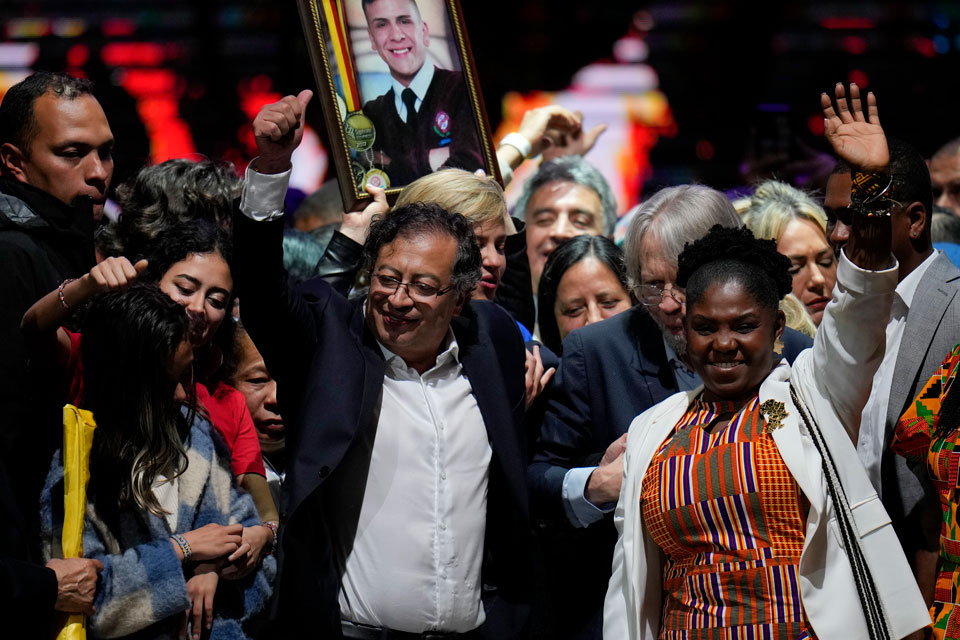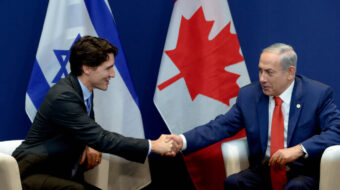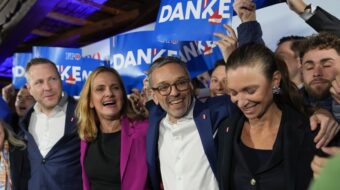
A comment on the Historical Pact coalition’s million-vote plurality overflowed with enthusiasm: “June 19 will be remembered [in Colombia] as a day of the people and will be a moment of celebration for democracy…. Today was a day for changing history.”
In second-round voting, the team of Gustavo Petro for president and Francia Márquez for vice president took 50.5% of the votes. The loose-lipped, right-wing construction and real estate mogul Rodolfo Hernández, candidate of the ad hoc League of Anti-Corruption Governors Party, gained 47.2%.
This was the third presidential campaign for Petro, a senator and former urban guerrilla and mayor of Bogotá, who took 40.3% of the votes in first-round voting on May 29. He and Vice President-elect Francia Márquez take office on August 7.
The historical significance of their electoral victory cannot be overstated. No real people’s government has ever ruled in Colombia. In the 20th century, high-profile presidential aspirants on the people’s side were murdered. At long last, the corrupt and deadly hold on power of former President Álvaro Uribe and his protégé Iván Duque, now leaving office, is over. And not least, the Historical Pact victory vindicates the countrywide mobilizations and demonstrations that, with mounting intensity from 2018 on, were carried out by young people and social movements.
Relishing their victory, candidates and voters alike by all accounts have taken on a new hopefulness. They are counting on an end to deadly violence and dispossession marking decades of history, and an end too of marginalization and rampant poverty diminishing the lives of multitudes of Colombians.
The ascent to Colombia’s vice-presidency of African-descended lawyer and award-winning environmental activist Francia Márquez, of humble origins, provides hope potentially for Colombia’s oppressed subsistence farmers, Afro-Colombians, and Indigenous peoples.
The Historical Pact victors represent hope for a watching world of solidarity activists. In that regard, they now join Presidents López Obrador of Mexico, Fernández of Argentina, Ortega of Nicaragua, Castillo of Peru, Xiomara Castro of Honduras, Arce and Morales of Bolivia, and Boric of Chile. To this constellation of left-leaning Latin American presidents is added the stubborn persistence of Venezuela’s progressive government and of Cuban socialism. The overall message is that real change is possible, despite U.S. interventions and all-but-open war.
Speaking to Colombians after his victory, Petro declared his intention “to build Colombia as a world power for life [which would consist] first of peace, secondly of social justice, and thirdly of environmental justice.”
Highlighting key passages in Petro’s remarks, observer Ollantay Itzamná identifies hopeful signs. He cites the president-elect’s references to war: “clandestine cemeteries,” U.S. air bases, Colombia’s association with NATO, paramilitaries, and narcotrafficking. Reflecting on Petro’s call for social justice, Itzamná qualifies Colombia’s inequalities as the region’s most pronounced, except for Honduras and Brazil. He mentions that 2% of landowners control 90% of Colombia’s useful agricultural land.
Petro would have “the polluter to pay for or remedy damages to “nature.” He called for a “transition to sources of clean energy.”
The news is not all good, however. As regards social justice, Petro announced “We are going to develop capitalism in order to take Colombia out of postmodern feudalism.” Petro’s purpose, says Itzamná, is to “generate and redistribute wealth… [But] this aspect is not at all clear, because in essence, capitalism is accumulation and is destructive of life.”
Petro as president will have to deal with a Colombian Congress made up of the representatives of multiple parties. The Historical Pact’s Senate delegation is the largest in that chamber, but not by very much, and will have to strike compromises with other well-represented party groupings. Petro’s coalition is only the second leading force in the House of Representatives.
Confronting the Petro administration will be the still-thriving power structures within Colombia represented by wealthy financial and business interests, big landowners, and narcotraffickers. Nor will U.S. interventionists and dark influences soon disappear, among them weapons manufacturers, banks that process narcotrafficking gains, the U.S. Southern Command, U.S. habits of regional domination, and U.S. and Colombian capitalists’ dread of people-centered political alternatives.












Comments